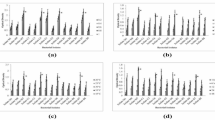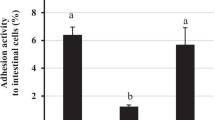Abstract
Chronic metabolic disorders such as hyperglycemia (diabetes), hyperlipidemia (high cholesterol), and cancer have become catastrophic diseases worldwide. Accordingly, probiotic intervention is a new approach for alleviating catastrophic diseases. In the present study, Pediococcus pentosaceus OBK05 was investigated as a potential probiotic bacterium for antidiabetic, cholesterol-lowering, and anticancer activities by in vitro and in vivo studies. Cell-free supernatant (CFS) of OBK05 showed potent antidiabetic activity by inhibition of α-amylase (72 ± 0.9%) and α-glucosidase (61 ± 0.8%) activity in vitro when compared to that of acarbose as standard (86 ± 0.9%). Furthermore, the in vivo cholesterol-lowering activity of OBK05 was studied using cholesterol-fed hypercholesterolemic mice. When compared to the cholesterol-fed group, the OBK05-intervened cholesterol-fed mice group had significantly lowered the levels of lipids and showed significantly lower lipid droplet accumulation in the histology of hepatocytes. Similarly, CFS exhibited higher anticancer activity (87.57 ± 1.27%) against HT-29 cells with an IC50 of 54.51 ± 1.8. Fluorescence-activated cell sorting (FACS) analysis revealed that CFS induced the cell cycle arrest by inhibiting the G1 to S phase transition. Further, in vivo anticancer activities were confirmed in BALB/c mice models, which were divided into four groups and held for 16 weeks. HT-29 cells (5×109/mice) were injected subcutaneously twice (0 and 2nd week), and OBK05 (3 ×105 CFU/mL) was given orally to the respective groups. The OBK05-intervened HT-29 cell–induced mice group showed significant improvement at the histological level and alleviated the degree of atypia in the intestine.
Graphical Abstract








Similar content being viewed by others
Data Availability
All data generated or analyzed during this study are included in this published research article. The supporting raw data of this article will be made available by the authors without undue reservation.
References
Won G, Choi SI, Park N, Kim JE, Kang CH, Kim GH (2021) In vitro antidiabetic, antioxidant activity, and probiotic activities of Lactiplantibacillus plantarum and Lacticaseibacillus paracasei strains. Curr Microbiol 78:3181–3191
Son SH, Jeon HL, Yang SJ, Lee NK, Paik HD (2017) In vitro characterization of Lactobacillus brevis KU15006, an isolate from kimchi, reveals anti-adhesion activity against foodborne pathogens and antidiabetic properties. Microb Pathog 112:135–141
Yadav R, Dey DK, Vij R, Meena S, Kapila R, Kapila S (2018) Evaluation of anti-diabetic attributes of Lactobacillus rhamnosus MTCC: 5957, Lactobacillus rhamnosus MTCC: 5897 and Lactobacillus fermentum MTCC: 5898 in streptozotocin induced diabetic rats. Microb Pathog 125:454–462
Zhang Y, Wu T, Li W, Zhao Y, Long H, Liu R, Zhang M (2021) Lactobacillus casei LC89 exerts antidiabetic effects through regulating hepatic glucagon response and gut microbiota in type 2 diabetic mice. Food Funct 12:8288–8299
Wang G, Si Q, Yang S, Jiao T, Zhu H, Tian P, Wang L, Li X, Gong L, Zhao J, Zhang H, Chen W (2020) Lactic acid bacteria reduce diabetes symptoms in mice by alleviating gut microbiota dysbiosis and inflammation in different manner. Food Funct 11:5898–5914
Gérard C, Vidal H (2019) Impact of gut microbiota on host glycemic control. Front Endocrinol 29
Lee S, Kim M (2019) Leuconostoc mesenteroides MKSR isolated from kimchi possesses α- glucosidase inhibitory activity, antioxidant activity, and cholesterol lowering effects. LWT 116:108570
Kim S, Hong SP, Lim SD (2021) Physiological characteristics and anti-diabetic effect of Pediococcus pentosaceus KI62. Food Sci Anim Resour 41:274
Wang G, Huang W, Xia Y, Xiong Z, Ai L (2019) Cholesterol-lowering potentials of Lactobacillus strains overexpression of bile salt hydrolase on high cholesterol diet-induced hypercholesterolemic mice. Food funct 10:1684–1695
World Health Organization (WHO) (2020) https://www.who.int/en/news-room/factsheets/detail/cardiovascular-diseases-(cvds). Accessed 23 Feb 2020
Lim PS, Loke CF, Ho YW, Tan HY (2020) Cholesterol homeostasis associated with probiotic supplementation in vivo. J Appl Microbial 129:1374–1388
Ding Z, Hani A, Li W, Ke W, Guo X (2020) Influence of a cholesterol-lowering strain Lactobacillus plantarum LP3 isolated from traditional fermented yak milk on gut bacterial microbiota and metabolome of rats fed with a high-fat diet. Food Funct 11:8342–8353
Guan X, Xu Q, Zheng Y, Qian L, Lin B (2017) Screening and characterization of lactic acid bacterial strains that produce fermented milk and reduce cholesterol levels. Braz J Microbiol 48:730–739
Saikia D, Manhar AK, Deka B, Roy R, Gupta K, Namsa ND, Chattopadhyay P, Doley R, Mandal M (2018) Hypocholesterolemic activity of indigenous probiotic isolate Saccharomyces cerevisiae ARDMC1 in a rat model. J Food Drug Anal 26:154–162
Shao Y, Huo D, Peng Q, Pan Y, Jiang S, Liu B, Zhang J (2017) Lactobacillus plantarum HNU082-derived improvements in the intestinal microbiome prevent the development of hyperlipidaemia. Food funct 8:4508–4516
Ding W, Shi C, Chen M, Zhou J, Long R, Guo X (2017) Screening for lactic acid bacteria in traditional fermented Tibetan yak milk and evaluating their probiotic and cholesterol- lowering potentials in rats fed a high-cholesterol diet. J Funct Foods 32:324–332
Damodharan K, Palaniyandi SA, Y SH, Suh JW, (2016) Functional probiotic characterization and in vivo cholesterol-lowering activity of Lactobacillus helveticus isolated from fermented cow milk. J Microbiol Biotechnol 26:1675–1686
Mann GV, Spoerry A (1974) Studies of a surfactant and cholesteremia in the Maasai. AM J Clin Nutr 27:464–469
Bedada TL, Feto TK, Awoke KS, Garedew AD, Yifat AT, Birri DJ (2020) Probiotics for cancer alternative prevention and treatment. Biomed pharmacother 129:110409
Nazir Y, Hussain SA, Abdul Hamid A, Song Y (2018) Probiotics and their potential preventive and therapeutic role for cancer, high serum cholesterol, and allergic and HIV diseases. Biomed Res Int. https://doi.org/10.1155/2018/3428437
O’Toole PW, Marchesi JR, Hill C (2017) Next-generation probiotics: the spectrum from probiotics to live biotherapeutics. Nat Microbial 2:1–6
Xiao L, Ge X, Yang L, Chen X, Xu Q, Rui X, Fan X, Feng L, Zhang Q, Dong M, Li W (2020) Anticancer potential of exopolysaccharide from Lactobacillus helveticus MB2-1 on human colon cancer HT-29 cell via apoptosis induction. Food Funct 11:10170–10181
Taieb J, André T, Auclin E (2019) Refining adjuvant therapy for non-metastatic colon cancer, new standards and perspectives. Cancer Treat Rev 75:1–11
Tiptiri-Kourpeti A, Spyridopoulou K, Santarmaki V, Aindelis G, Tompoulidou E, Lamprianidou EE, Saxami G, Psilantis PY, Lampri ES, Simopoulos C, Kotsianidis I (2016) Lactobacillus casei exerts anti-proliferative effects accompanied by apoptotic cell death and up-regulation of TRAIL in colon carcinoma cells. PLoS One 11:e0147960
Bhukya KK, Bhukya B (2021) Unraveling the probiotic efficiency of bacterium Pediococcus pentosaceus OBK05 isolated from buttermilk: an in vitro study for cholesterol assimilation potential and antibiotic resistance status. PLoS One 16:e0259702
Wang G, Li X, Zhao J, Zhang H, Chen W (2017) Lactobacillus casei CCFM419 attenuates type 2 diabetes via a gut microbiota dependent mechanism. Food Funct 8:3155–3164
Pammi N, Bhukya KK, Lunavath RK, Bhukya B (2021) Bioprospecting of Palmyra palm (Borassus flabellifer) nectar: unveiling the probiotic and therapeutic potential of the traditional rural drink. Front Microbiol 12
AlKalbani NS, Turner MS, Ayyash MM (2019) Isolation, identification, and potential probiotic characterization of isolated lactic acid bacteria and in vitro investigation of the cytotoxicity, antioxidant, and antidiabetic activities in fermented sausage. Microb Cell Fact 18:1–12
Jafari-Nasab T, Khaleghi M, Farsinejad A, Khorrami S (2021) Probiotic potential and anticancer properties of Pediococcus sp. isolated from traditional dairy products. Biotechnol Rep 29:e00593
Chandel D, Sharma M, Chawla V, Sachdeva N, Shukla G (2019) Isolation, characterization and identification of antigenotoxic and anticancerous indigenous probiotics and their prophylactic potential in experimental colon carcinogenesis. Sci Rep 9:1–12
Rajoka MSR, Zhao H, Lu Y, Lian Z, Li N, Hussain N, Shi J (2018) Anticancer potential against cervix cancer (HeLa) cell line of probiotic Lactobacillus casei and Lactobacillus paracasei strains isolated from human breast milk. Food Funct 9:2705–2715
Dubey V, Ghosh AR, Bishayee K, Khuda-Bukhsh AR (2016) Appraisal of the anti-cancer potential of probiotic Pediococcus pentosaceus GS4 against colon cancer: in vitro and in vivo approaches. J Funct Foods 23:66–79
Asadollahi P, Ghanavati R, Rohani M, Razavi S, Esghaei M, Talebi M (2020) Anticancer effects of Bifidobacterium species in colon cancer cells and a mouse model of carcinogenesis. PLoS One 15(5):e0232930
Wang L, Shang Q, Guo W, Wu X, Wu L, Wu L, Chen T (2020) Evaluation of the hypoglycemic effect of probiotics via directly consuming glucose in intestines of STZ-induced diabetic mice and glucose water-induced diabetic mice. J Funct Foods 64:103614
Li X, Wang N, Yin B, Fang D, Zhao J, Zhang H, Wang G, Chen W (2016) Lactobacillus plantarum X1 with α-glucosidase inhibitory activity ameliorates type 2 diabetes in mice. RSC advances 6:63536–63547
Koh WY, Utra U, Ahmad R, Rather IA, Park YH (2018) Evaluation of probiotic potential and anti-hyperglycemic properties of a novel Lactobacillus strain isolated from water kefir grains. Food Sci Biotechnol 27:1369–1376
Cai T, Wu H, Qin J, Qiao J, Yang Y, Wu Y, Qiao D, Xu H, Cao Y (2019) In vitro evaluation by PCA and AHP of potential antidiabetic properties of lactic acid bacteria isolated from traditional fermented food. LWT 115:108455
Kang JH, Yun SI, Park HO (2010) Effects of Lactobacillus gasseri BNR17 on body weight and adipose tissue mass in diet-induced overweight rats. J Microbiol 48:712–714
Damodharan K, Lee YS, Palaniyandi SA, Yang SH, Suh JW (2015) Preliminary probiotic and technological characterization of Pediococcus pentosaceus strain KID7and in vivo assessment of its cholesterol-lowering activity. Front Microbial 6:768
Fazeli H, Moshtaghian J, Mirlohi M, Shirzad M (2010) Reduction in serum lipid parameters by incorporation of a native strain of Lactobacillus Plantarum, A7 in Mice. J Diabetes Metab Disord 9:22
Wu Y, Zhang Q, Ren Y, Ruan Z (2017) Effect of probiotic Lactobacillus on lipid profile: A systematic review and meta-analysis of randomized, controlled trials. PLoS One 12:e0178868
Ye H, Li Q, Zhang Z, Sun M, Zhao C, Zhang T (2017) Effect of a novel potential probiotic Lactobacillus paracasei, Jlus66 isolated from fermented milk on nonalcoholic fatty liver in rats. Food Funct 8:4539–4546
El-Deeb NM, Yassin AM, Al-Madboly LA, El-Hawiet A (2018) A novel purified Lactobacillus acidophilus 20079 exopolysaccharide, LA-EPS-20079, molecularly regulates both apoptotic and NF-κB inflammatory pathways in human colon cancer. Microb Cell Fact 17:1–15
Jaskulski IB, Uecker J, Bordini F, Moura F, Gonçalves T, Chaves NG, Camargo F, Grecco FB, Fiorentini AM, da Silva WP, Andreazza R (2020) In vivo action of Lactococcus lactis subsp. lactis isolate (R7) with probiotic potential in the stabilization of cancer cells in the colorectal epithelium. Process Biochem 91:165–171
Lenoir M, Del Carmen S, Cortes-Perez NG, Lozano-Ojalvo D, Muñoz-Provencio D, Chain F, Langella P, de Moreno de LeBlanc A, LeBlanc JG, Bermúdez-Humarán LG, (2016) Lactobacillus casei BL23 regulates Treg and Th17 T-cell populations and reduces DMH-associated colorectal cancer. J gastroenterol 51:862–873
Acknowledgements
Authors are grateful to the University Grants Commission (UGC), Govt. of India, Indian Council of Medical Research, Govt. of India and the Ministry of Human Resource Development, Govt. of India, for financial support to carry out the present study.
Funding
This work was supported by the University Grants Commission (UGC), Govt. of India, through major research project (F. No. 41- 1145/2012(SR)) and RGNF fellowship (F. No. 2015-17/ RGNF-2015-17-TEL-1236) and the Ministry of Human Resource Development, Govt. of India, through RUSA 2.0 program.
Author information
Authors and Affiliations
Contributions
Kiran Kumar Bhukya designed and carried out all the experiments pertaining to microbial screening, strain isolation, in vitro probiotic characteristics, in vivo experiments and prepared the manuscript. Bhima Bhukya conceptualized and monitored the experiments, corrected the manuscript and the corresponding author. All authors read and approved the final manuscript.
Corresponding author
Ethics declarations
Disclaimer
The funders had no role in study design, data collection and analysis, decision to publish, or preparation of the manuscript.
Conflict of Interest
The authors declare no competing interests.
Additional information
Publisher's Note
Springer Nature remains neutral with regard to jurisdictional claims in published maps and institutional affiliations.
Rights and permissions
Springer Nature or its licensor (e.g. a society or other partner) holds exclusive rights to this article under a publishing agreement with the author(s) or other rightsholder(s); author self-archiving of the accepted manuscript version of this article is solely governed by the terms of such publishing agreement and applicable law.
About this article
Cite this article
Bhukya, K.K., Bhukya, B. Exploration of Antidiabetic, Cholesterol-Lowering, and Anticancer Upshot of Probiotic Bacterium Pediococcus pentosaceus OBK05 Strain of Buttermilk. Probiotics & Antimicro. Prot. 15, 1484–1500 (2023). https://doi.org/10.1007/s12602-022-10002-0
Accepted:
Published:
Issue Date:
DOI: https://doi.org/10.1007/s12602-022-10002-0




